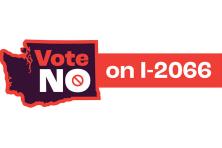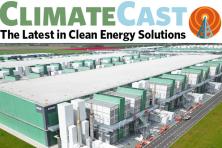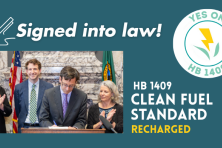Update 6 May: Legislators have reached concurrence on HB 1589; the utility decarbonization bill is headed to Gov. Inslee's desk for his signature.
Olympia, WA—Washington State’s energy landscape has changed more in the last 5 years than in the last 50, and two new laws, passed off the Senate floor late in the day on March 1, just ahead of one of 2024’s last major legislative deadlines, demonstrate a deepening in Washington’s effort against climate change. HB 1589 requires the state’s largest gas utility (Puget Sound Energy) to plan for the clean energy transition and create electrification programs to transition customers off of its gas system. SB 6058 is the first of many steps in linking Washington’s landmark Climate Commitment Act (cap-and-invest) program with the California-Québec program, setting a strong standard for the entire country (and world) to pursue ambitious climate policies and prioritize benefits in historically overburdened communities.
Ultimately with so many sectors of Washington’s economy now covered and required to reduce pollution under the state’s existing climate policy landscape, newer efforts such as HB 1589 address the nitty gritty of how we reduce emissions and who will benefit from the transition. The possibilities represented in SB 6058 continue a frame long held by climate policymakers in Washington: Washington State can lead by example and has the potential to influence other jurisdictions to pursue and strengthen ambitious climate policies to create the pollution-reduction scale truly needed to slow and stop the climate crisis.
Both HB 1589 and SB 6058 now move to their respective originating chambers for concurrence votes anticipated before the end of the 2024 legislative session on Mar 7.
More on HB 1589 (Gas Utility Decarbonization)
With the passage of HB 1589, the Washington legislature outlines a thoughtful planning approach and regulatory tools that support utility planning in reducing emissions and transitioning to clean energy. “Combination” utilities such as Puget Sound Energy (PSE), which provide both gas and electric service, are in a unique position to facilitate the clean energy transition in the short and long term. Ultimately the law is unique in that it commits a large utility, publicly and in statute, to a pathway that reduces emissions, prioritizes electrification, and provides forward-thinking programs to help transition customers from gas to electric. HB 1589 will put Puget Sound Energy on track for cleaner air and zero-emissions buildings and will establish new programs to help households, including low- and middle-income households, access cleaner and healthier sources of energy, like efficient electric heat pumps and other clean appliances. This pathway includes:
- Requires PSE to create an integrated system plan for both electric and gas operations that will put the company on track to achieve its share of Climate Commitment Act (CCA) emissions reduction requirements and increase targets for energy efficiency and demand response. The UTC will provide oversight to ensure that the plan is implemented equitably, and that customers are protected with rates that remain fair and reasonable.
- Prioritizes CCA revenue to first provide bill assistance and electrification programs for low-income customers, followed by electrification programs for all other customers. Low-income customers already spend an outsized share of their income on energy bills. HB 1589 requires PSE to eliminate the cost burdens on low-income customers by providing bill credits or other incentives to help transition off of fossil fuels and buy efficient electric appliances. Currently there are limited rebates available to utility customers wanting to switch from natural gas to electric, and this bill will help create new programs and options for customers.
More on SB 6058 (Linkage)
SB 6058 is the first step in the possibility of “linking” or combining Washington’s carbon allowance market with the California-Québec joint market. While only making small technical changes to Washington’s Climate Commitment Act program, SB 6058 is part of the Department of Ecology’s formal decision to pursue linkage in the coming years and would signal to other jurisdictions that Washington is willing to be an active and collaborative partner. Linkage is ultimately a multi-year process that will include robust stakeholder engagement, environmental justice analysis, and negotiations with other jurisdictions. SB 6058 intends to align program elements with California and Quebec’s programs, such as aligning compliance periods and changing purchase limits at auctions for covered businesses to 25 percent from 10 percent.
Notably the CCA program is still in its infancy, with just the first year of allowance auctions completed in 2023. The majority of clean energy investments and benefits are just beginning to come online this year such as: improving air quality through $120M in cutting pollution from large, diesel trucks and buses, $50M in new community-led grant programs to address health disparities in overburdened communities, $80M to clean up indoor air quality and support low- and moderate-income households in retrofitting their homes and purchasing heat pumps, $20M to provide industrial decarbonization incentives, $105M for community EV charging infrastructure for schools and multifamily housing, and more.
Washington’s CCA program set a national precedent for making environmental justice and engagement with overburdened communities a centerpiece of its cap-and-invest policy. Policymakers made a concerted effort to learn from the critiques of California’s program. If linkage is implemented well, with Washington’s protections for and benefits to overburdened communities and ambitious carbon pollution trajectory still in place, linking markets can come with significant opportunities for Washington and will ensure the longevity and stability of its landmark cap-and-invest law, while also leading to greater pollution reductions and other benefits in linked jurisdictions.




